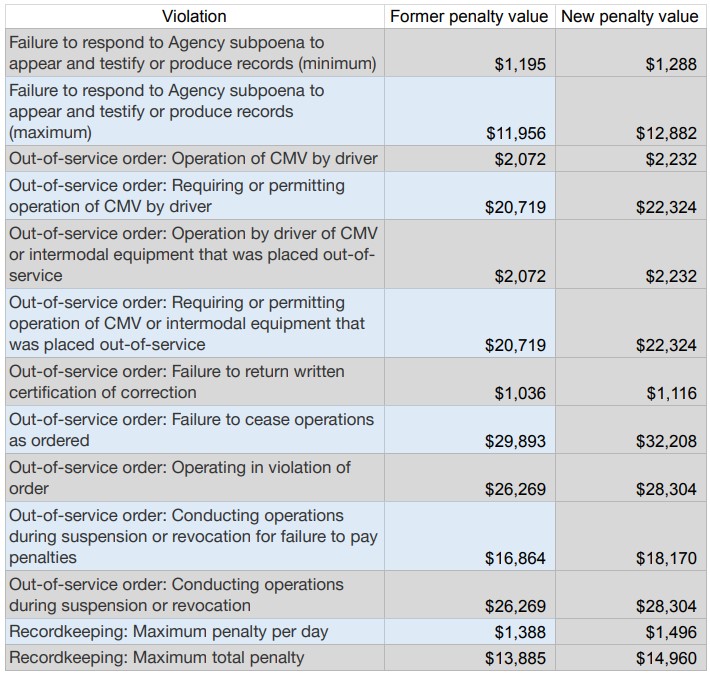Furry Friends Cause Trucking Border Delays At Canadian Border
To prevent reintroduction of rabies carried by dogs into the United States, new CDC regulations require proof of healthy pets at border crossing. Truckers who
We are a team of DOT Compliance and Licensing Professionals helping trucking and transportation companies remain safe, compliant, and profitable.
CNS or Compliance Navigation Specialists is DOT Compliance company that assists trucking and transportation companies remain DOT Compliant. We are part of a network of companies, CNS Companies, specializing in services related to the transportation, manufacturing, construction, service, education and medical industries.

A full-scale DOT Compliance Program managing a long haul carrier’s safety, compliance, licensing and more.
Learn more >>>
A DOT Compliance Program that keeps motor carriers compliant with the 6 Basic DOT Regulations required of all carriers.
Learn more >>>
Our Short-Haul/Construction Program is a full-scale program designed for private carriers that do not haul for-hire.
Learn more >>>
Our most comprehensive DOT Compliance Program, operating as your company’s off-site Safety Director or assisting your current safety personnel.
Learn more >>>
Our Non-CDL Program is a full-scale program managing safety, compliance, licensing and more for moving companies, couriers, landscapers, or any company subject to DOT regulations and does not employ CDL drivers.
Learn more >>>
Our DOT Audit Services cover a number of different types of DOT Audits that new and existing carriers will be subject to.
Our DOT Driver Services help trucking companies and carriers to stay compliant as they grow and hire more drivers.
Our DOT Vehicle Services focus on ensuring your vehicles are compliant with DOT Regulations, which is just as important as your drivers.
Our DOT Services for Special Carriers focus on companies outside of the typical motor carrier, like HAZMAT, Passenger and Bus Carriers.
CNS is part of a group of companies that offer other necessary services for the trucking and transportation industry, such as Commercial Trucking Insurance, CDL Training, Online Training Course, and even Healthcare.
Our DOT Licensing Services will cover you whether you are an existing company or just starting a trucking company. Our DOT Licensing Specialists can help you get up and running and in days with your DOT number, MC Authority, EIN, UCR, IFTA, 2290 HVUT, Fuel Taxes and can even set you up to get your Commercial Driver's License (CDL) with CNS Driver Training Center.
Our DOT Licensing Specialists will help you with every aspect of starting a trucking company. All you need to do is choose a name for your trucking company.
You will need to ensure your DOT Number, MC Authority, Vehicle Registration, etc. is all set up properly when you start your trucking business.
Our Licensing Specialists can help with all aspects of filing and renewing licenses, fuel taxes, etc.
CNS is part of a group of companies that offer other necessary services for the trucking and transportation industry, such as Commercial Trucking Insurance, CDL Training, Online Training Course, and even Healthcare.
To prevent reintroduction of rabies carried by dogs into the United States, new CDC regulations require proof of healthy pets at border crossing. Truckers who
CNS or Compliance Navigation Specialists is DOT Compliance company that assists trucking and transportation companies remain DOT Compliant. We are part of a network of companies, CNS Companies, specializing in services related to the transportation, manufacturing, construction, service, education and medical industries.
CNS Companies is a network of companies specializing in services related to the transportation, manufacturing, construction, service, education and medical industries. Our DOT Compliance division is handled by Compliance Navigation Specialists, CNS Insurance handles Commercial Truck Insurance, CDL training is managed by the CNS Driver Training Center and healthcare is managed by CNS Occupational Medicine.
We are a team of DOT Compliance and Licensing Professionals helping trucking and transportation companies remain safe, compliant, and profitable.
CNS or Compliance Navigation Specialists is DOT Compliance company that assists trucking and transportation companies remain DOT Compliant. We are part of a network of companies, CNS Companies, specializing in services related to the transportation, manufacturing, construction, service, education and medical industries.

A full-scale DOT Compliance Program managing a long haul carrier’s safety, compliance, licensing and more.
Learn more >>>
A DOT Compliance Program that keeps motor carriers compliant with the 6 Basic DOT Regulations required of all carriers.
Learn more >>>
Our Short-Haul/Construction Program is a full-scale program designed for private carriers that do not haul for-hire.
Learn more >>>
Our most comprehensive DOT Compliance Program, operating as your company’s off-site Safety Director or assisting your current safety personnel.
Learn more >>>
Our Non-CDL Program is a full-scale program managing safety, compliance, licensing and more for moving companies, couriers, landscapers, or any company subject to DOT regulations and does not employ CDL drivers.
Learn more >>>
Our DOT Audit Services cover a number of different types of DOT Audits that new and existing carriers will be subject to.
Our DOT Driver Services help trucking companies and carriers to stay compliant as they grow and hire more drivers.
Our DOT Vehicle Services focus on ensuring your vehicles are compliant with DOT Regulations, which is just as important as your drivers.
Our DOT Services for Special Carriers focus on companies outside of the typical motor carrier, like HAZMAT, Passenger and Bus Carriers.
CNS is part of a group of companies that offer other necessary services for the trucking and transportation industry, such as Commercial Trucking Insurance, CDL Training, Online Training Course, and even Healthcare.
Our DOT Licensing Services will cover you whether you are an existing company or just starting a trucking company. Our DOT Licensing Specialists can help you get up and running and in days with your DOT number, MC Authority, EIN, UCR, IFTA, 2290 HVUT, Fuel Taxes and can even set you up to get your Commercial Driver's License (CDL) with CNS Driver Training Center.
Our DOT Licensing Specialists will help you with every aspect of starting a trucking company. All you need to do is choose a name for your trucking company.
You will need to ensure your DOT Number, MC Authority, Vehicle Registration, etc. is all set up properly when you start your trucking business.
Our Licensing Specialists can help with all aspects of filing and renewing licenses, fuel taxes, etc.
CNS is part of a group of companies that offer other necessary services for the trucking and transportation industry, such as Commercial Trucking Insurance, CDL Training, Online Training Course, and even Healthcare.
To prevent reintroduction of rabies carried by dogs into the United States, new CDC regulations require proof of healthy pets at border crossing. Truckers who
CNS or Compliance Navigation Specialists is DOT Compliance company that assists trucking and transportation companies remain DOT Compliant. We are part of a network of companies, CNS Companies, specializing in services related to the transportation, manufacturing, construction, service, education and medical industries.
CNS Companies is a network of companies specializing in services related to the transportation, manufacturing, construction, service, education and medical industries. Our DOT Compliance division is handled by Compliance Navigation Specialists, CNS Insurance handles Commercial Truck Insurance, CDL training is managed by the CNS Driver Training Center and healthcare is managed by CNS Occupational Medicine.

Do everything you can to reduce safety risk to prevent audits and recessionary pressures.
The FMCSA has increased its maximum fines by almost 8 percent for 2023 in their annual update. This is one of the largest increases ever and is on top of last year’s 6.2% fine increase.
The inflation metric calculate is based on Oct ’21 to Oct ’22 percent change in the Consumer Price Index, as required in a 2015 Act.
This rule does not change previously assessed or enforced penalties that DOT is actively collecting or has collected.
So, it will be even costlier to receive a violation and fine in 2023. But what does this look like?
[Related: Best Audit Guide In Trucking Industry]
It’s pretty simple, to reflect inflation a safety violation could now result in a fine of over $18,000 compared to $16,800 last year.
The most common fines paid in 2022 were for: hours-of-service rules, such asviolating the 11-hour or 14-hour driving rules, drug testing, vehicle maintenance, and falsifying driving logs.
Below is a list of fines in 2023:

The updated fines for FMCSA regulations violations can be seen here.
While a single minor DOT violation is unlikely to lead to long-term damage for your company, repeat violations will.
In other words, a history of repeat violations can cause shippers to become concerned for the safety of their cargo. But this is just one example.
Repeat violations can crush your fleet’s reputation by:
Trucking companies that are considered “high risk” have bad SAFER scores, high losses, accidents, driver issues, and conditional ratings.
Culture is key to implement the changes necessary to pull yourself out of this category, but it can take time to see the changes reflect in your SAFER scores and over-the-road performance.
If you are worried about being considered “high risk”, reach out to CNS and CNS Insurance to shop for a high-risk policy and assistance with risk mitigation.
Accuracy, organization, and diligence are crucial to keeping your files in order and ready for an audit at a moment’s notice and ensuring new drivers are properly qualified before operating in a safety sensitive position.
At CNS, our DQ file management system is completely customizable to your company’s needs. The consultants at CNS stay in communication with you regarding document updating, as well as offering comprehensive reports upon request, and reports of routine audits by our own DQ file auditors.
Our DOT Compliance Specialists will ensure all DQ files for your company will be ready to pass an FMCSA audit.
Beyond DQ files, our safety management programs are perfect for combining multiple services and focuses on Proactive Safety Management (PSM), a mindset that will ensure your fleet’s safety and compliance is always in order and ahead of the FMCSA.
Our PSM Motor Carrier Program includes:

To prevent reintroduction of rabies carried by dogs into the United States, new CDC regulations require proof of healthy pets at border crossing. Truckers who

This means future regulations will “become clearer” or “stuck in the courts” for years. On June 28, 2024, the U.S. Supreme Court overturned the Chevron

EPA’s new truck emission standards will require 25% of new sleeper-cab tractors to be zero-tailpipe-emission trucks by 2032. On March 29, 2024, the U.S. Environmental

Did you know that there have been more than 3.4 million brakes inspected since the program’s inception in 1998? As we prepare for CVSA’s Brake
Our DOT Compliance Programs ensure it is your top priority and keeps your business running.
Receive the latest transportation and trucking industry information about FMCSA and DOT Audits, Regulations, etc.

To prevent reintroduction of rabies carried by dogs into the United States, new CDC regulations require proof of healthy pets at border crossing. Truckers who

This means future regulations will “become clearer” or “stuck in the courts” for years. On June 28, 2024, the U.S. Supreme Court overturned the Chevron

EPA’s new truck emission standards will require 25% of new sleeper-cab tractors to be zero-tailpipe-emission trucks by 2032. On March 29, 2024, the U.S. Environmental
Join our monthly newsletter and stay up-to-date on trucking industry news and receive important compliance and licensing tips.
Join our monthly newsletter and stay up-to-date on trucking industry news and receive important compliance and licensing tips.